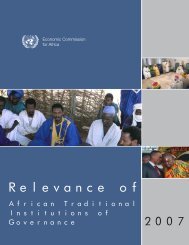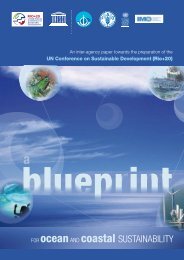Download Publication - Rio+20
Download Publication - Rio+20
Download Publication - Rio+20
Create successful ePaper yourself
Turn your PDF publications into a flip-book with our unique Google optimized e-Paper software.
26<br />
GREEN ECONOMY<br />
Challenges and<br />
opportunities<br />
The necessarily<br />
systemic character<br />
of the transition to a<br />
green economy<br />
Alexandre d'Avignon<br />
Luiz Caruso<br />
In the UNEP publication, biodiversity, as an example of a public good,<br />
would not be valued properly in neoclassical economics. Nor can neoclassical<br />
economics properly value environmental services, which contribute to human<br />
welfare and family livelihoods and could provide a source of new skilled<br />
jobs. Estimating the economic value of ecosystem services is essential for<br />
the identification of natural capital. This is one of the dimensions that would<br />
support the transition to a green economy, stimulating a change in conventional<br />
economic indicators and leading them to account for the loss of natural capital<br />
as negative and not positive components of national accounts. Is the correct<br />
valuation of these services associated with favorable conditions sufficient<br />
conditions for this transition?<br />
How can one assign new parameters to a green economy, if the essential<br />
discussion of equity and local participation is kept on the sidelines? The<br />
voracious consumption of energy and natural resources characteristic of<br />
industrialized countries shows that this is not a development model that<br />
respects the biosphere, its principles and pace of regeneration. The legacy left<br />
by development based on fossil fuels has brought to the forefront global issues<br />
such as climate change and ozone layer destruction, revealing economic options<br />
that were imposed, causing the abandonment of innovations that could have<br />
been stimulated by national innovation systems, which would involve R&D,<br />
legal framework of incentives and patent system. An important example would<br />
be the intensive use of biomass through the BTL (Biomass to Liquid) or BTG<br />
(Biomass to Gas) at a growth rate appropriate to the regenerative capacity of<br />
natural resources. Energy from solar and photovoltaic sources, wind power,<br />
hydrogen, more efficient batteries were not adequately exploited due to current<br />
technological route, causing the abandonment in the past of other options.<br />
It is worth recalling that Rudolf Diesel patented his engine to work with<br />
vegetable oils, in this case of peanuts, and even before his presentation at<br />
the Paris World Fair in 1898, there were manufactures of vehicles with electric<br />
motors. The latter have proliferated in public transport with trams, which were<br />
later replaced by internal combustion vehicles in several cities. If there had not<br />
been an imposition by specific economic sectors, these technologies could<br />
have persisted and received a share of investments from national innovation<br />
systems. In this case, the options nowadays in terms of development of<br />
technologies considered as alternatives would have been much more promising,<br />
comprehensive and widespread.<br />
Nº 8 • June 2011<br />
This short historical account raises other issues related to the green economy.<br />
Could the problems generated by the economy practiced today be overcome by<br />
adopting the recommendations proposed by UNEP, during the next 20 years,<br />
as indicated by the scenario options displayed in “Towards a Green Economy:<br />
Pathways to Sustainable Development and Eradication Poverty”? Shouldn’t

















